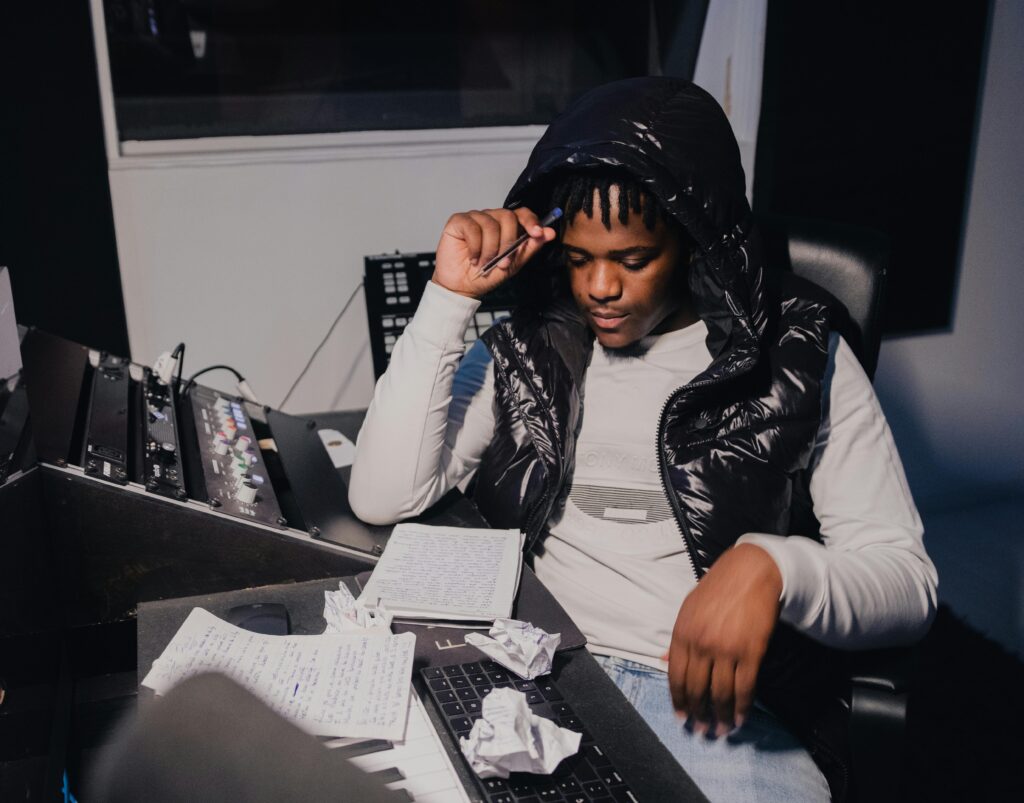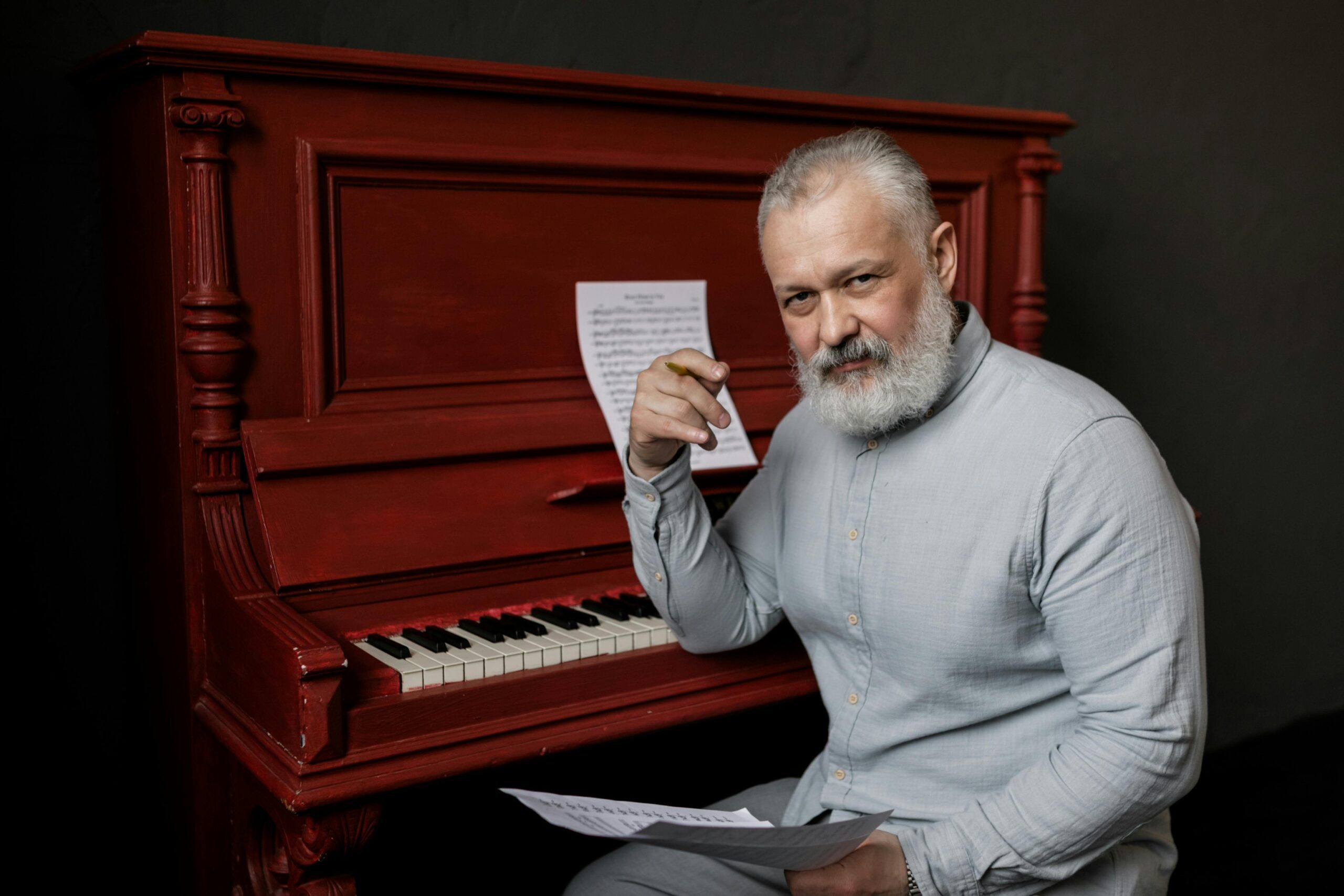How To Be A Music Composer: Becoming a music composer is a journey filled with creativity, passion, and dedication. Whether you’re drawn to classical compositions, film scores, video game music, or any other genre, the path to becoming a composer involves honing your skills, cultivating your creativity, and navigating the industry. Moreover, this comprehensive guide will walk you through the essential steps to embark on this exciting career path.
Understanding the Role of a Music Composer


Before delving into the intricate process of embarking on the journey to become a music composer, it is imperative to grasp the multifaceted role and myriad responsibilities that come intertwined with this esteemed profession. Also, transitioning into the realm of music composition requires a deep appreciation for the art form and a comprehensive understanding of the craft’s nuances. Moreover, aspiring composers must recognize the significance of their role in shaping auditory experiences and evoking emotions through their compositions.
Transitioning into the realm of music composition requires a deep appreciation for the art form and a comprehensive understanding of the craft’s nuances. Moreover, aspiring composers must recognize the significance of their role in shaping auditory experiences and evoking emotions through their compositions. Additionally, as one ventures into this creative domain, they are tasked with the responsibility of translating abstract ideas and emotions into tangible musical expressions that resonate with audiences.
Journey
The journey of becoming a music composer demands a steadfast commitment to honing one’s skills, continuously expanding their musical repertoire, and exploring diverse genres and styles. Furthermore, it is essential for composers to cultivate a strong foundation in music theory, composition techniques, and proficiency in playing at least one instrument.
In addition to technical prowess, successful composers possess a keen sense of creativity, innovation, and the ability to think outside the conventional boundaries of music. Also, they must constantly experiment with new sounds, instruments, and arrangements to infuse freshness and originality into their compositions. Additionally, collaboration with other musicians, producers, and directors often plays a pivotal role in the creative process, necessitating effective communication and teamwork skills.
Transitioning from novice to seasoned composer involves navigating a journey filled with challenges, setbacks, and moments of inspiration. Despite the inevitable obstacles along the way, perseverance, resilience, and a relentless passion for music propel individuals forward on their path towards mastery. Moreover, seeking guidance from experienced mentors, participating in workshops, and studying the works of renowned composers can provide invaluable insights and inspiration.
As composers strive to carve out their unique artistic identity, they must also adapt to the evolving landscape of the music industry. Also, embracing technological advancements, leveraging digital audio workstations (DAWs), and staying abreast of industry trends are essential for staying relevant in a competitive market. Furthermore, understanding copyright laws, licensing agreements, and royalty structures is crucial for protecting intellectual property rights and earning a sustainable income from compositions.
1.1 What Does a Music Composer Do?


A music composer holds a multifaceted role within the realm of artistic expression, entrusted with the task of crafting original musical compositions that resonate across an array of mediums.
Composing for Film
In the dynamic world of filmmaking, a composer becomes a crucial collaborator in the director’s vision, translating narrative arcs and character developments into melodic motifs and harmonic landscapes.
Television Composition
Television shows, spanning genres from drama to comedy, from suspense to romance, rely on the ingenuity of composers to underscore pivotal moments, character dynamics, and thematic continuity throughout the series.
Video Games
Video games present a unique challenge and opportunity for composers to shape the player’s experience through adaptive music systems, heightening tension during climactic battles or soothing weary travelers as they explore vast virtual worlds.
Advertising
In the realm of advertising, composers play a pivotal role in crafting identities for brands, harnessing the power of music to captivate audiences, evoke nostalgia, and also leave a lasting impression.
Orchestral Performances
Beyond screens and speakers, composers find expression in the grandeur of orchestral performances, where their compositions come to life through the virtuosity of musicians and the acoustics of concert halls.
1.2 Skills Required


The Art and Science of Music Composition
To excel as a music composer requires a multifaceted skill set, encompassing a rich blend of musical prowess, technical acumen, creative flair, and interpersonal abilities. At the core of this craft lies a profound mastery of music theory and composition techniques, serving as the foundation upon which all musical creations are built. Understanding harmony, melody, rhythm, and structure is paramount, as it enables composers to craft compositions that resonate deeply with audiences.
Musical Proficiency: A Composer’s Toolbox
Furthermore, proficiency in playing one or more musical instruments is indispensable for a composer. Whether it’s the piano, guitar, violin, or any other instrument, the ability to perform allows composers to translate their musical ideas into tangible expressions, fostering a deeper connection with their compositions and enhancing their creative process.
Embracing Technology in Music Production
In the contemporary landscape of music production, technological proficiency is equally essential. Composers must possess a strong command of various music production software and equipment, enabling them to manipulate sound, refine arrangements, and bring their compositions to life with precision and finesse. From digital audio workstations (DAWs) to virtual instruments and synthesizers, staying abreast of the latest advancements in music technology is crucial for maintaining a competitive edge in the industry.
Cultivating Creativity and Innovation
Yet, technical proficiency alone does not suffice; it must be coupled with boundless creativity and innovation. True mastery of the craft demands the ability to push artistic boundaries, to experiment with novel sounds and styles, and to weave intricate musical tapestries that captivate and enthrall listeners. Whether composing for film, television, video games, or the concert hall, the mark of a distinguished composer lies in their capacity to imbue their compositions with a distinct identity, evoking a myriad of emotions and resonating with audiences on a profound level.
Collaborative Excellence
Moreover, collaboration skills are indispensable for navigating the collaborative nature of the music industry. Composers frequently collaborate with directors, producers, fellow musicians, and other stakeholders, requiring adept communication, compromise, and adaptability. The ability to translate conceptual visions into musical realities, while remaining receptive to feedback and incorporating diverse perspectives, is pivotal for ensuring the success of collaborative projects and fostering enduring professional relationships.
Time Management and Organization: Keys to Success
In addition to artistic prowess and collaborative finesse, effective time management and organizational skills are essential. Composers often face tight deadlines and demanding schedules, necessitating meticulous planning, prioritization, and efficient workflow management. By honing these skills, composers can navigate the intricate balance between creative exploration and timely delivery, ensuring that their compositions are completed to the highest standard, without compromise.
Developing Musical Skills (How To Be A Music Composer)


2.1 Study Music Theory
Music theory forms the foundation of composition. Familiarize yourself with concepts such as harmony, melody, rhythm, chord progressions, and orchestration. Resources like books, online courses, and tutorials can help you grasp these fundamentals.
2.2 Learn an Instrument
Learning to play an instrument provides valuable insight into musical structure and phrasing. Piano, guitar, violin, and flute are popular choices among composers, but any instrument can be beneficial. Practice regularly to improve your proficiency and understanding of musical expression.
2.3 Experiment with Composition
Start composing your own music early on. Experiment with different genres, styles, and instrumentation. Don’t be afraid to make mistakes; they’re an essential part of the learning process. Analyze your compositions to understand what works well and where you can improve.
2.4 Formal Education
Consider pursuing formal education in music composition or music theory. Many colleges and universities offer degree programs in music composition, providing instruction from experienced composers and access to state-of-the-art facilities.
Mastering Composition Techniques (How To Be A Music Composer)


3.1 Study the Masters
Study the works of renowned composers across various genres and time periods. Furthermore, analyze their compositions to understand their techniques, use of instrumentation, and musical forms. This study will broaden your musical vocabulary and inspire your own creations.
3.2 Practice Regularly
Consistent practice is essential for honing your composition skills. Therefore, set aside dedicated time each day to compose music, experiment with new ideas, and refine your compositions. The more you practice, the more proficient you’ll become at translating your musical vision into reality.
3.3 Embrace Feedback
Seek feedback from fellow composers, musicians, and mentors. Constructive criticism can help you identify areas for improvement and refine your compositions. Be open to feedback and use it as an opportunity to grow as a composer.
3.4 Develop Your Unique Style
While studying the works of others is valuable, it’s important to develop your unique voice as a composer. Experiment with different musical elements, explore unconventional techniques, and draw inspiration from your own experiences and emotions. Your unique perspective is what will set your compositions apart.
Navigating the Industry (How To Be A Music Composer)


4.1 Build a Portfolio
Create a portfolio showcasing your compositions. Include recordings or sheet music of your work, as well as any relevant projects or collaborations you’ve been involved in. Your portfolio serves as a visual representation of your skills and style as a composer.
4.2 Networking
Networking is crucial for establishing yourself in the music industry. Attend concerts, workshops, and industry events to meet fellow composers, musicians, directors, and producers. Utilize social media platforms and online forums to connect with industry professionals and showcase your work.
4.3 Collaborate with Filmmakers and Directors
Collaborating with filmmakers and directors is a common avenue for composers to gain exposure and experience. Offer to score short films, student projects, or independent films to build your portfolio and establish relationships within the film industry.
4.4 Pursue Internships or Assistant Positions
Internships or assistant positions with established composers or music production companies can provide valuable hands-on experience and industry connections. Look for opportunities to assist with composing, arranging, orchestrating, or music production.
Leveraging Technology (How To Be A Music Composer)


5.1 Learn Music Production Software
Familiarize yourself with music production software such as Digital Audio Workstations (DAWs), virtual instruments, and music notation software. These tools enable you to compose, arrange, and produce professional-quality music from the comfort of your own home.
5.2 Build a Home Studio
Setting up a home studio allows you to work on your compositions independently and professionally. Moreover, invest in quality recording equipment, acoustic treatment, and monitoring systems to create a conducive environment for music production.
5.3 Stay Updated with Technology
The field of music production is constantly evolving with advancements in technology. Furthermore, stay updated with the latest software updates, plugins, and production techniques to enhance your compositions and workflow.
Continuing Education and Growth


6.1 Attend Workshops and Masterclasses
Participate in workshops, masterclasses, and also continuing education programs to expand your knowledge and skills as a composer. These opportunities provide valuable insights from industry professionals and allow you to stay current with industry trends.
6.2 Seek Mentorship
Seek mentorship from experienced composers or music industry professionals. Moreover, a mentor can offer guidance, advice, and support as you navigate your career path and overcome challenges along the way.
6.3 Never Stop Learning
The journey of a composer is one of continuous learning and growth. Furthermore, stay curious, explore new genres and techniques, and never stop challenging yourself creatively. Embrace each opportunity as a chance to evolve as a composer and push the boundaries of your artistry.
Conclusion
Becoming a music composer is a rewarding yet challenging journey that requires dedication, perseverance, and a deep passion for music. However, by honing your skills, cultivating your creativity, and navigating the industry with resilience and determination, you can turn your dream into a reality. Remember to stay true to your unique voice, embrace collaboration and feedback, and never stop pursuing your musical aspirations. Also, with persistence and passion, the world of music composition is yours to explore and conquer.


